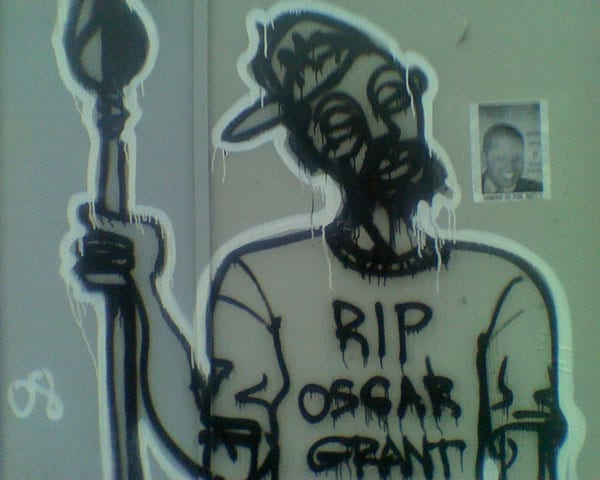
February 14, 2019; San Francisco Examiner
Oscar Grant was killed on the Bay Area Rapid Transit (BART) platform of Fruitvale Station by a BART police officer later convicted of involuntary manslaughter, and his family has been petitioning ever since to have the station named after him. Grant’s shooting by a BART officer in 2009 was caught on camera by several onlookers, eliciting massive outrage. A resolution by San Francisco Supervisors Shamann Walton and Hillary Ronen reads, “The murder of Oscar Grant sparked a worldwide movement that demanded justice for his murder and an end to the murders of African American and Latino young men from police brutality.” (Four years later, Grant’s murder would become the subject of the award-winning film, Fruitvale Station, directed by Ryan Coogler, who would later go on to direct Marvel’s Black Panther).
Johannes Mehserle, the officer who shot Grant—in the back, as he lay face down on the platform—has long since been convicted and released after spending two years behind bars, but Grant’s family and other advocates have refused to let the matter go unacknowledged. They have sued, organized, and steadfastly advocated for change.
Grant’s family wanted the BART station where the incident occurred named for him and a plaque installed in the spot where he was shot. The BART board said it can’t (or won’t) change the policy of naming stations after their location but did vote unanimously last week to rename the street beneath the station Oscar Grant III Way. (One board member, Debora Allen, was absent.) When the board dedicates the road, they will also unveil a memorial mural of Oscar.
Wanda Johnson, Grant’s mother, said it was a step of “atonement.”
Sign up for our free newsletters
Subscribe to NPQ's newsletters to have our top stories delivered directly to your inbox.
By signing up, you agree to our privacy policy and terms of use, and to receive messages from NPQ and our partners.
“We’re going to take one step at a time,” Johnson said, “We just have to continue to press, continue to chip away. You’re going to reach your destination in due season.”
In December, Pam Bailey wrote for NPQ about the memorialization and episodic memory formation, and how “places serve as natural vehicles for memorialization,” helping us lock significant events in our collective memories so we can learn from them going forward.
BART directors said on Thursday that “police reforms enacted years ago were also meaningful efforts to recognize him,” according to the San Francisco Chronicle’s Kimberly Veklerov. However, according to statistics collected by the nonprofit site MappingPoliceViolence.org, the Oscar Grants of the world still have reason to fear the police. In 2015, six years after Grant was shot, San Francisco had the eighth-highest rate of police killings among the 60 largest US cities. Nearby Oakland had the third-highest rate. The Daily Californian found that more than half of police violence incidents in 2017 involved black men. Whatever those reforms were, they need work.
Since her son’s death, Wanda Johnson has founded the Oscar Grant Foundation to “help bridge the gap of distrust between individuals in at-risk communities and law enforcement.” She has advocated tirelessly to memorialize Oscar, a fact recognized by the BART directors. “I am so proud that this community, this particular family, has decided to work so closely with government,” said Director Lateefah Simon. “You refused not just to stay silent—you refused to not make systemic change in this agency.” Johnson has said she wants her son remembered as a man and a father, not a distant figure.
The resolution drafted by the board of directors to rename the street acknowledged the foundation’s work with the district on several initiatives, including a BART Police Citizen Review Board, the BART Office of the Independent Police Auditor, and an annual community vigil.—Erin Rubin













